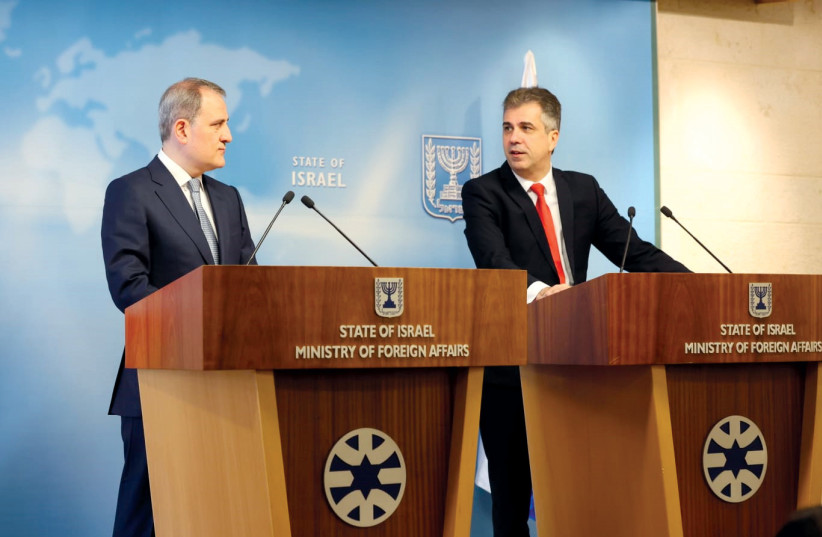Foreign Minister Eli Cohen made an important trip this week to Azerbaijan and Turkmenistan, where he inaugurated the Israeli Embassy – located only 17 kilometers from Iran.
The Foreign Ministry was keen to stress the proximity, even though this is primarily an accident of geography because the capital city is near Iran. Yet it cannot be lost on the Iranians that Israel now has close ties with two of its neighbors, with Iran boasting in the last months that it is “unifying” fronts against Israel and that the US, Israel’s ally, is losing influence in the Middle East.
The Israel-Azerbaijan relationship
The trip to Azerbaijan had a large delegation and highlighted business and trade ties. Israel already has trade relations with Azerbaijan, but these are expected to increase, while Israel’s defense companies have already had good relationships in Baku. Yet there is likely a lot more depth to this relationship that can grow beyond defense. That could mean extending the relationships into other aspects of homeland security, cybersecurity, agriculture and other services.

The Israel-Azerbaijan relationship is unique, with a strong history. Unlike ties with Turkey, which have been more rocky in the last two decades, ties with Baku have grown and grown, as has Iran’s anger at Azerbaijan.
Tehran, in turn, has increased its rhetoric against Baku, but this has not caused Azerbaijan to change course. Russia’s invasion of Ukraine might also have sent shock waves through the Caucasus. After all, it was Russian President Vladimir Putin’s clash with Georgia in 2008 that set the pattern for more Russian moves around the world and eventually into Ukraine.
Russia backs the Syrian regime, for instance. Baku has not been intimidated by any of this. Instead, Azerbaijan has increased its posture in the region and increasingly clashed with Armenia.Across the Caspian Sea is Turkmenistan, one of the five Central Asian states that were once part of the USSR. Israel has ties with some of them that are not traditionally hostile to the Jewish state.
However, these countries are also watching how the world is changing. The US’s withdrawal from Afghanistan means that Western ties with Central Asia are evaporating. Today, these states need to work with Russia, China, Iran, Pakistan or each other or find ways to reach out to India or Turkey; otherwise, they can become isolated, so Israel is a good partner for countries such as Turkmenistan.
Israel has the technology and other innovative solutions that may be of interest in Central Asia. However, these states may see pushback from Iran. Iran inaugurated a drone factory in Tajikistan in 2022. Iran and China both want to extend trade corridors into Central Asia.
The Foreign Ministry said Cohen had inaugurated the Israeli Embassy in Ashgabat in the presence of the Turkmenistan foreign minister and ambassadors from the UAE, Azerbaijan and the US, an important and symbolic move.
Israel has strong ties with a number of Muslim countries, a process that started in 2020 with the Abraham Accords. It is also growing ties with Morocco and Egypt and repairing its ties with Jordan. There is much to be done. Fighting in Sudan, for instance, is a tragedy because Sudan and Israel have ties, and Sudan had expectations for closer ties to Israel and using Israeli technology to improve Sudan.
Nevertheless, the outreach to Azerbaijan and Turkmenistan showcases Israel’s important diplomatic moves. It also demonstrates Israel’s orientation toward the east and Asia. These are key ties, and they should be fostered.The Middle East has seen many diplomatic moves in recent months: Saudi Arabia normalized ties with Iran, and Riyadh’s foreign minister was recently in Damascus. In addition, Saudi Arabia hosted the King of Jordan this week.As the diplomatic era dawns again in the region, Israel has many possibilities to increase its inroads with various countries, chief of which could be Saudi Arabia.
The visits to Baku and Ashgabat are a reminder that Israel’s current government can commit to important diplomatic initiatives, a prelude to more important moves.
